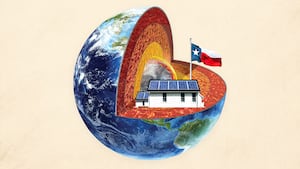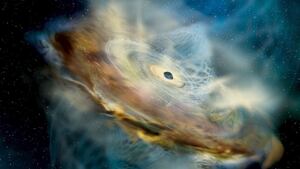In 2003, Hollywood released a disaster movie dubbed The Core in which the Earth’s core inexplicably stops rotating—threatening to destroy all life as we know it due to the collapsing magnetic field. To fix it, a group of scientists are tasked with burrowing under the crust and nuking the core in order to get it to start spinning again.
It was a truly ridiculous and convoluted story even by Hollywood standards. But it turns out, there might be some truth to the idea that the Earth’s core can stop or change its rotation—and even result in some weird effects here on the surface.
An international team of researchers have discovered evidence that suggests that the Earth’s inner core may have recently stopped before reversing its rotation. While it might not destroy all life on the planet, the reversal might result in some changes to Earth’s own rotation. A paper of the study was published Jan. 23 in the journal Nature Geoscience.
“It has effects on the magnetic field and the Earth’s rotation, and probably the surface processes and climate,” Xiaodong Song, a seismologist at the SinoProbe Lab at the School of Earth and Space Sciences of Peking University and co-author of the study, told The Daily Beast in an email. “Hard to say good or bad, but something to pay attention to as part of the earth’s global change.”
When we talk about Earth’s core, we’re typically referring to two things: the outer core, which is liquid and made up of molten iron and nickel; and the inner core, which is a solid ball of iron-nickel alloy. The inner core is separated from the rest of the Earth by the outer core, so it rotates differently as well. Since it’s a giant ball of metal, it carries its own electrical current that creates a magnetic field that surrounds our planet and protects us from cosmic radiation. Without this magnetic field, Earth would be a barren, irradiated wasteland.

Earth's core creates a magnetic field that surrounds our planet and protects us from cosmic radiation. Without this magnetic field, Earth would be a barren, irradiated wasteland.
TUMEGGY/SCIENCE PHOTO LIBRARY via GettySo studying the core isn’t just a pet project to better understand how Earth behaves; it’s also necessary to clue us in on potential changes that could affect life on the surface.
To reach their findings, Song and his co-author (Peking University research scientist Yi Yang) measured changes in both the waveform and travel time of seismic waves from earthquakes that passed through the inner core since the 1960s. They discovered that “temporal changes in the waveform shape simultaneously and consistently disappeared” around 2009, suggesting that the inner core stopped rotating.
However, Song said they also observed a “slight but robust opposite trend” in waveforms, which suggests that the inner core might have begun reversing its rotation. The authors believe that this could be a part of a seven-decade cycle in which the core spins and reverses. This cycle coincides with the changes in Earth’s magnetic field.
But Song adds that “we haven’t seen a full cycle of the predicted seven-decade oscillation” and the team will be “pursuing more recent data to test models and predictions.”
Luckily for us, the researchers also explained that we’re not likely to encounter any world-ending scenarios. The reversal also won’t strongly affect Earth’s magnetic field—resulting in a pole reversal where north becomes south and vice versa.
“The inner-core rotation is more likely to be related with the periodic fluctuation of the magnetic field changes,” Song said. “The fluctuation is too small to change its sign from positive to negative.”
Still, it might be a good idea to get a team of scientists together in case we need to nuke the core for any reason. Maybe Elon Musk’s Boring Company will finally have something useful to accomplish.








